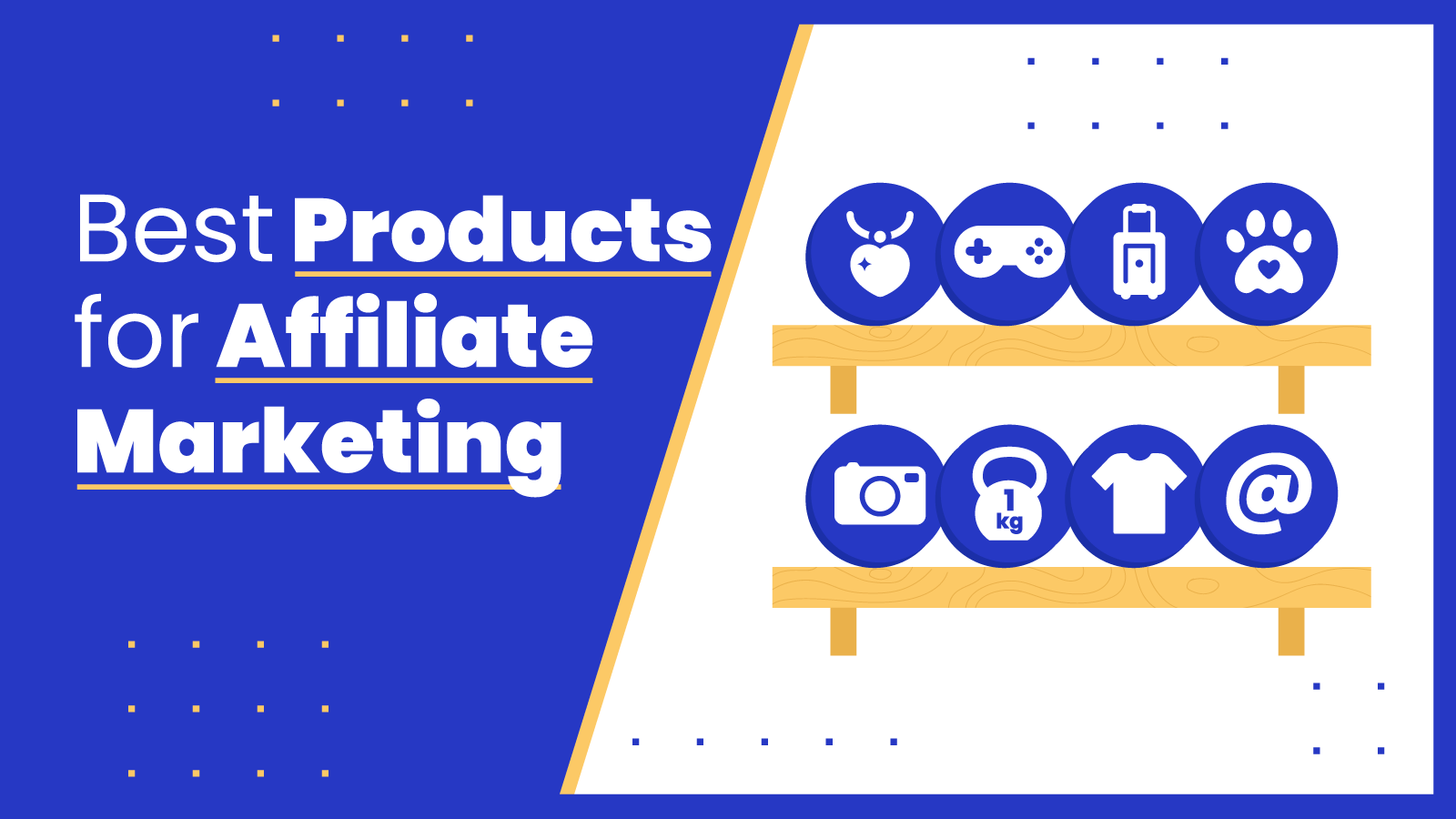With 15 years in the game, I’m a seasoned affiliate marketing veteran. And I’ve been on both sides as an affiliate and running affiliate programs. So I’ve encountered many of these affiliate marketing scams in real life.
In this article, I’ll share the most common affiliate scams. I’ll also give you the knowledge to recognize them and, most importantly, avoid affiliate marketing scams.
Whether you’re an aspiring affiliate marketer or a new affiliate manager, this guide will shine a bright light on the dark corners of the industry. Let us give you the tools to help you to steer clear of common affiliate marketing scams.
Jump to:
- Affiliate marketing scams targeting affiliate marketers
- Affiliate marketing scams targeting affiliate managers
But first, a word on affiliate marketing in general.
Is Affiliate Marketing Legit?
Yes, affiliate marketing is legit. Affiliate marketing is not a scam, it’s a highly effective strategy for brands to increase sales and for affiliate marketers to earn commissions. That’s why 81% of brands and 94% of publishers are all-in on affiliate marketing, according to our affiliate marketing statistics page.
We’re proud affiliates ourselves. We’ve built a thriving business in affiliate marketing, giving marketers the know-how and tools to succeed online. Plus, we actively engage in affiliate marketing across our website network, earning a serious commission along the way.
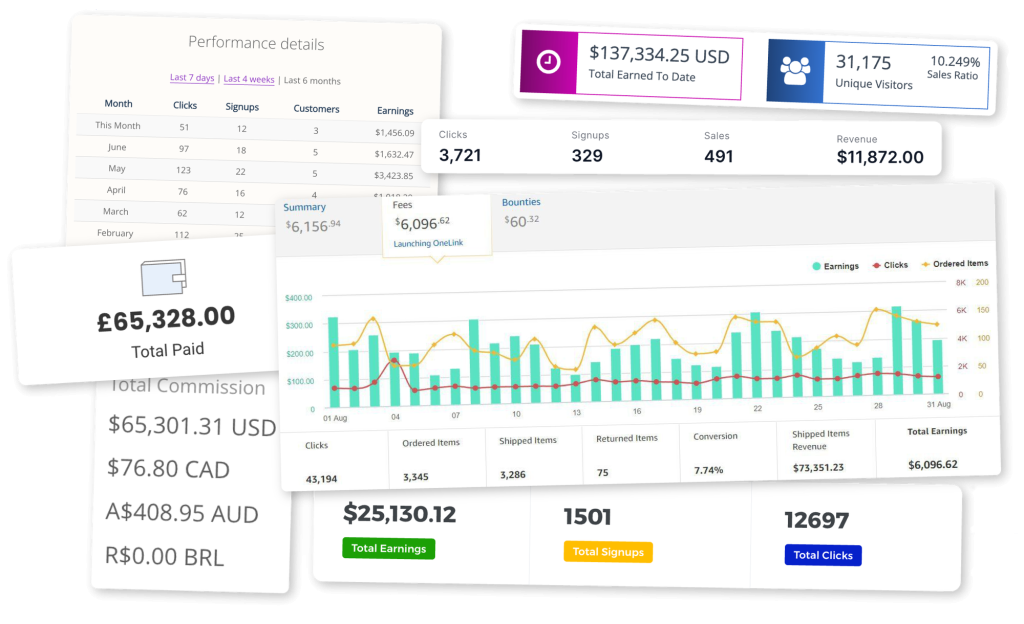
So, we’re here to say that affiliate marketing can be an essential tool in your monetizing arsenal. It’s a powerful online marketing channel embraced by countless brands and millions of affiliates worldwide. There’s nothing shady about it.
As an affiliate marketer, you simply promote products and earn a commission when users click your link to buy.
The business model is straightforward. But if you’re curious to learn more, check out our guide: “Is affiliate marketing worth it?”
Affiliate Marketing Scams Targeting Affiliates
As the affiliate marketing industry explodes in popularity, so too does the frequency of common affiliate marketing scams. These scams prey on unsuspecting affiliate marketers.
They fall into two categories:
- Those that trick affiliate marketers into paying for access to resources that should be free or inexpensive.
- And those that dupe affiliate marketers into promoting illegitimate companies to unsuspecting customers.
1 Get-Rich-Quick Schemes
We’ve all seen them – those flashy ads and irresistible headlines that promise a quick financial windfall.
Some affiliate marketing programs and products make these claims to entice you into promoting their offers, but the hype often exceeds reality, making it tough to achieve success.
Building a thriving affiliate marketing business is possible. But success often doesn’t happen overnight. It takes grit, persistence and a willingness to learn.
Case Study: My Online Business Education (MOBE)

The feds swooped in and shut down My Online Business Education (MOBE), alleging a web of fraud and deceit.
MOBE hawked a so-called “proven” 21-step system. This promised to teach eager learners how to rake in cash. How? By promoting their products and services as affiliates. The kicker? They charged thousands of dollars for different membership levels.
But, the FTC didn’t buy MOBE’s flashy claims. They accused them of duping customers with bogus marketing tactics and not delivering on their promises. This left most consumers in dire financial straits.
So, how can you spot and avoid affiliate marketing scams like these?
How to spot a get-rich-quick scheme
- Unrealistic income claims: If it sounds too good to be true, it probably is. Be wary of programs that promise massive earnings with little effort.
- Lack of transparency: Legit affiliate marketing programs should be upfront about their business model, products, and services.
- Lack of guarantees: Be cautious if a program doesn’t offer any guarantees or money-back policies.
- Pressure to act quickly: Scammers love to prey on the panicked, so don’t rush into a decision before researching the opportunity.
How to avoid get-rich-quick schemes
- Research the product or program on social media platforms: Look for real users and their experiences with the program.
- Search for recent case studies: Legitimate programs should have success stories to back up their claims.
- Be skeptical of exaggerated claims: Question any promises that seem too good to be true and ask for evidence.
- Focus on promoting legitimate opportunities: Stick with reputable companies and products with a proven track record.
2 Pay-to-Join Affiliate Programs
These affiliate marketing scams are quite rare these days, and I couldn’t find any recent examples. But there’s a chance you might stumble upon one in a niche industry, so it’s essential to be aware of them.
In a nutshell, in a pay-to-join affiliate marketing program, you’re required to pay fees or make purchases before joining. That’s a huge red flag 🚩. All affiliate marketing programs should be free to join.
Sure, some programs may have audience size or experience requirements, but they shouldn’t ask you to pay.
Remember, they should be paying you, not the other way around. After all, you work for them and they have no risk if you don’t make sales.
How to avoid pay-to-join programs
The best way to avoid pay-to-join programs is to walk away as soon as they ask for a fee. Stick to free-to-join programs, and you’ll be in the clear.
But don’t confuse product knowledge requirements with pay-to-join scams. Many legit brands want you to be well versed in their product before you promote it.
Take the online marketing industry for example. When I promoted tools in this market, they wanted me to be familiar with them before allowing me in. But, if you show you are serious and have some creds to back you up, you can often score the product for free. So it’s not really a pay-to-join affiliate marketing program.
3 Fake Gurus and Courses
Another common affiliate marketing scam involves touting fake products or services. Sometimes, people who claim to be experts sell courses or coaching programs that promise amazing results. But, they might be teaching outdated or unethical methods.
These people don’t actually do what they teach, or they stopped doing it a long time ago. They make a living by selling their courses, not from affiliate marketing. And if you want a refund, it’s usually not possible.
To be transparent, at Authority Hacker, we also sell an affiliate marketing course. However, we have:
- A proven track record of building and selling affiliate sites (our last sale was in 2024)
- Hundreds of student testimonials showing our system works
- A 30-day money-back guarantee that allows you to test our system risk-free
How to spot fake gurus and courses
- Too good to be true: Be careful of courses that promise you’ll make lots of money with little effort. If it sounds too good, it’s probably fake.
- No real proof: Trustworthy success is easy to see. Be cautious of a “guru” who can’t show solid evidence of their own achievements or their students’.
- Questionable testimonials: Look for honest feedback from real people. If they seem fake or are scarce, think twice.
- Missing case studies: Real experts will have case studies and examples of their own work and their students’.
- No money-back guarantee: A reliable course will offer a refund policy to support their product.
- Pushy sales tactics: Be on the lookout for forceful marketing and high-pressure sales strategies. They might be trying to sell you something that won’t deliver.
How to avoid fake gurus and courses
- Research social networks: Look at real user experiences on Facebook, Reddit, and Twitter.
- Read reviews on other websites: Honest reviews on sites like eBizFacts can help you decide.
- Make sure there’s a refund policy: Keep your money safe by checking for a refund policy.
4 Pyramid Schemes and MLMs
I’ve seen my fair share of affiliate marketing scams and schemes in the industry. And let me tell you, some affiliate programs are actually pyramid schemes or multi-level marketing (MLM) schemes in disguise.
These affiliate marketing scams often present themselves as legitimate affiliate training programs to prey on unsuspecting individuals looking to earn money online. In reality, they’re just recruiting funnels designed to profit off new recruits.
Case study: Empower Network

Take Empower Network, for example. At first, this program led by Dave Wood appeared to be a genuine blogging SEO service. Members paid each other $25 a month for a copied website on the Empower Network domain. The goal was to bring in more people and achieve unbeatable search ranking success.

When the domain faced penalties and search traffic dropped, the focus turned to more expensive marketing modules.
This led to fewer affiliates joining and less money being exchanged between them. In the end, Empower Network fell apart. Many people called it a pyramid scheme or an affiliate marketing scam because of its business model.
How to spot MLM offers
- Recruitment over sales: If a program emphasizes recruiting new members more than selling actual products or services, it might be a pyramid scheme. Real affiliate programs should concentrate on sales, not recruitment fees.
- Unclear income model: A legitimate affiliate program will have an easy-to-understand commission structure and revenue sources. If the income model is unclear or confusing, it could mean there isn’t a solid income source in place.
- Online discussions: Look at online communities like Reddit, Facebook groups, and forums to see what people say about the program. If you find several complaints or warnings about it being a pyramid scheme or MLM, be careful.
How to avoid getting caught up in a pyramid scheme or MLM
- Say no to upfront fees and purchases: Legitimate affiliate programs don’t need you to pay hefty fees or buy products just to earn commissions. Be wary of any program that asks for cash up front, as it could be a telltale sign that it’s all about recruitment, not sales.
- Check the company’s reputation and legal status: Look for reviews, testimonials, and any legal issues or complaints against the company. If a program has a history of being shut down or investigated by governments, it’s best to steer clear.
- Tap into online communities: As mentioned earlier, online communities can offer the inside scoop on potential scams. Ask for opinions and experiences from others in the industry before joining any program.
5 Shady Products and Services
There are many legitimate affiliate programs in adult niches like porn, gambling, and legal highs. And while many programs in these niches are legit, some may try to trick you into promoting illegal or fake products. That could land you in hot water.
Remember: just because it’s an adult niche doesn’t mean you should lower your moral standards or risk your reputation. Do your research, and only promote legal products from reputable programs.
Case study: How we almost promoted a product that got shut down by the FBI
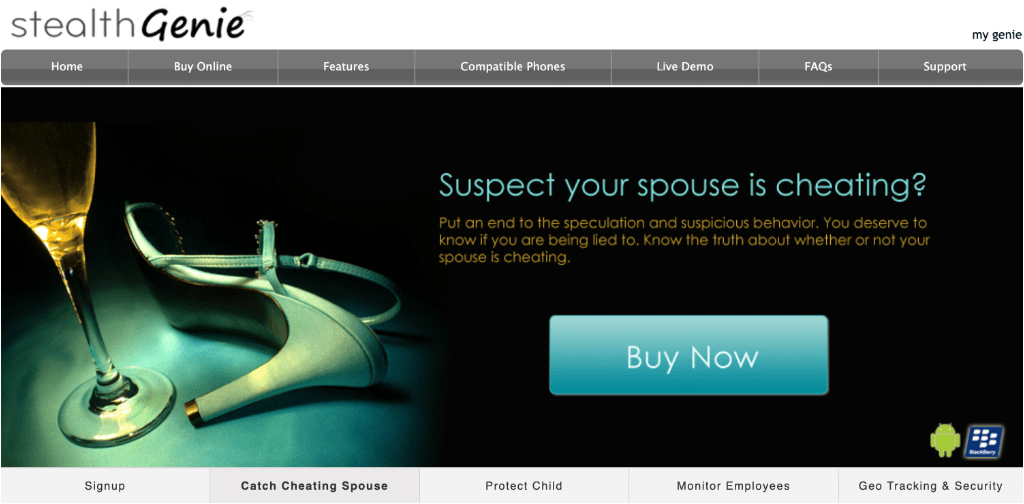
Here’s a cautionary tale about a high-paying affiliate offer gone wrong. It almost brought down our entire site at Authority Hacker. Our affiliate site focused on privacy, so when we discovered an offer for StealthGenie, a product promising sky-high commissions and low-competition, high-intent SEO keywords, it seemed like a match made in heaven. But things took a dark turn.
StealthGenie was a mobile spyware app that allowed users to secretly monitor all communications and activities on someone’s phone without their knowledge. People used it to spy on partners, employees, and even parents. Shady, right? It gets worse.
The app violated federal wiretap laws and caught the attention of the FBI. They shut down the website, and StealthGenie’s CEO was arrested in 2014. He later pleaded guilty and faced a $500,000 fine. Since then, the app has been illegal and unavailable.
As for our affiliate site, we narrowly dodged disaster. We had content written and a whole new site section ready to launch but pulled the plug at the last minute. After seeing what happened to the CEO, we couldn’t be happier with our decision.
How to spot a shady product or service
- Information Blackout: If a product or service is not transparent about its features, benefits, or how it works, that’s a major red flag. Don’t fall for the mystery box approach!
- Bad Reputation: Before promoting or buying, make sure to check out reviews and ratings from other customers or affiliates. If the feedback is overwhelmingly negative, it’s time to move on.
- Warning Signs: If there are multiple warnings or complaints from customers or authorities about the product or service, take heed! It’s not worth the risk.
- Trust Your Gut: When all else fails, trust your instincts. If something seems too good to be true, unethical, or illegal, it probably is.
How to avoid shady products and services
- Choose reputable affiliate networks and programs: Stick to well-known and respected affiliate networks and programs. They have a reputation to uphold and are less likely to promote shady products.
- Check the product quality and legality: Before promoting a product, make sure it’s of high quality and complies with the law. Promoting illegal products can put you in a lot of trouble.
- Follow the rules: Familiarize yourself with the rules and regulations of the affiliate programs you join. This will help you avoid promoting products that could land you in hot water.
- Stay on top of your industry: Keep yourself updated on your niche’s news and trends. This way, you’ll be aware of any changes and potential issues that might affect your affiliate marketing efforts.
6 Fake Products or Services
In the quest for high commissions and easy money, some affiliates end up promoting fake products, another common affiliate marketing scam.
Let’s take a closer look at this issue and how you can avoid falling into this trap.
Case study: The Herpes Blueprint

Herpes is a well-known virus that can’t be cured. So, any product claiming to “cure” it is simply a scam.
Promoting such a product can harm your relationship with your audience and hurt your reputation as an affiliate marketer.
Still, the makers of these fake products tempt affiliates with promises of high commissions (50%) and easy money.

How to spot fake products or services
- Unreliable information: Be cautious if a product lacks trustworthy sources or makes unclear claims. Look for solid information before trusting the product.
- Questionable customer reviews: Genuine products usually have a mix of good and bad reviews from real users. If there are no reviews or they all seem too positive, be careful.
- Fake science: Watch out for products that claim to go against well-known scientific facts. If it seems too good to be true, it likely is.
How to avoid promoting “fake” products
- Check the product’s credibility: Before promoting any product, make sure to research it. Look for trustworthy sources, customer reviews, and any scientific proof that supports its claims.
- Pick dependable affiliate networks: Stick with well-known affiliate networks that are known for carefully selecting the products they offer. These networks should handle the task of making sure the products you promote are legitimate.
- Do your research: Don’t just rely on the product creator or the affiliate network’s opinion. Investigate further and make sure you understand the product, its claims, and any possible warning signs.
In the fast-paced world of affiliate marketing, falling for affiliate marketing scams can be a career-ending mistake. But fear not, with a little caution and savvy decision-making, you can stay on top of your game.
Choose your affiliates wisely, verify the product’s legitimacy, and never compromise your reputation for a quick buck. By doing so, you’ll be well on your way to building a successful and legitimate business. So, keep your eyes peeled and your standards high. Happy (and ethical) affiliate marketing! 🚀
Affiliate Marketing Scams Targeting Affiliate Managers
Time to turn the tables and expose affiliate marketing scams and frauds that could harm affiliate managers and advertising companies.
Most of these scams involve dishonest affiliates getting commissions they don’t deserve. Here’s the list:
1 Click Fraud & Boot (Spoof) Traffic
Affiliate marketing means money, but with that money comes risk. Scammers use bots to create fake clicks and traffic. This can cost affiliate managers a lot, especially in pay-per-click programs where they pay for every click, even if it doesn’t lead to a sale.
Click farms are groups of people or computers that keep clicking on ads from different IP addresses. This makes it look like real users are interested. Another trick is using botnets, networks of computers infected with malware. Scammers control these computers and make them click on ads all at once, creating lots of clicks quickly.
Some scammers use ad stacking, a sneaky way of putting several ads on top of each other. When a user clicks on one ad, they actually click on multiple ads at once, making more money for the scammer.
There’s also click injection, where scammers use apps that can access a user’s device to click on ads without the user knowing. This makes it hard for advertisers to find the affiliate marketing fraud.
How to spot click fraud
- Check traffic sources: Look for strange clicks from unknown sources or a sudden increase in traffic from one place.
- Watch click patterns: Keep an eye on high or sudden spikes in clicks that don’t seem normal or match your usual traffic patterns.
- Compare conversion rates: Look at your conversion rates compared to industry averages and investigate big differences.
- Use fraud detection tools: Use tools that help find patterns in your click data, making it easier to spot fraud.
- Keep track of IP addresses: Watch IP addresses connected to clicks. Look for any strange or repeated activity.
- Study user behavior: Look at how users interact with your ads and website. Check for signs that clicks might not be real.
How to avoid click fraud
- Set clear terms and conditions: Make sure your affiliates know what you expect from them and what happens if they do something wrong.
- Use good tracking tools: Spend money on great software that helps you watch and control your affiliate traffic.
- Stop or block bad affiliates: Act fast if you find out an affiliate is doing click fraud, by stopping or banning them from your program.
- Set click limits: Decide how many clicks an affiliate can send at first, so you can lower the chance of click fraud while checking the quality of their traffic.
2 Lead Frauds
Click fraud isn’t the only way scammers trick affiliate marketers. Some also use lead fraud to cheat the system by creating fake or stolen leads for their affiliate programs.
They may submit leads with fake, incorrect, or incomplete information. They could offer rewards to users for submitting leads. Or they buy leads from third-party providers without verifying their quality.
One scheme involves creating fake accounts to submit leads. Then there’s redirecting traffic from legitimate sources to their landing pages and using bots or other automated tools to submit leads. Finally, they might use stolen personal information to generate fraudulent leads.
How to spot lead fraud
- Check lead quality: Make sure contact information is correct, and the lead is genuinely interested in your offer. Use lead scoring to rank leads based on their value.
- Examine traffic sources: A sudden increase in leads from a suspicious source could indicate lead fraud.
- Look for duplicates or odd patterns: Regularly review your lead database for any strange patterns.
- Monitor conversion rates: A significant drop in conversions might mean you’re getting fake or low-quality leads. Investigate leads that aren’t converting to find patterns or similarities.
How to avoid lead fraud
- Set clear lead criteria: Make sure your affiliates know what you’re looking for in a lead and keep them updated with any changes.
- Use double opt-in or verification: This helps avoid stolen contacts or fake emails that could harm your reputation.
- Regularly check lead quality: Investigate affiliates generating the lowest quality leads.
- Use lead validation tools: These tools can remove low-quality leads before they cause problems, saving you time and resources.
- Know your affiliates: Verify their identity and maintain open communication. This builds trust and helps address any concerns or issues that may come up.
3 Sale & Transaction Frauds
One of the most common affiliate marketing scams faced by affiliate managers is sale and transaction frauds perpetrated by scammer affiliates. They might use tactics like using fake or stolen credit cards to make purchases through their affiliate links or codes. They’ll earn commissions on those fraudulent sales.
Another trick up their sleeve is manipulating conversion tracking data,. This makes it seem like they’re generating legitimate sales when they’re actually not.
How to Spot Sale Fraud
- Look for unusual transactions: Watch out for many high-value purchases made quickly.
- Check refund rates: A high refund rate might mean customers are unhappy, or it could be a sign of fraud.
- Compare billing and shipping info: If the addresses don’t match, it could be a warning sign of fraud.
- Watch for payment processor alerts: Companies like Stripe can flag possible fraud and send warnings.
How to Avoid Sale Fraud
- Choose safe payment methods: Make sure you use trusted payment gateways and processors to lower the chances of fake transactions.
- Set up fraud prevention measures and policies: Be ready and create clear steps to find and stop fraud in your affiliate program.
- Check commissions yourself: Instead of approving commissions automatically, look at them yourself to catch any possible affiliate fraud.
- Watch how your affiliates do: Pay attention to things like how many sales your affiliates make and the average amount of each sale. If something seems off, it could be a sign of fraud.
- Teach your affiliates: Help your affiliates understand the risks and results of sales fraud. Ask them to tell you if they see anything strange.
4 URL Hijacking (Typosquatting)
Picture this: You’re an affiliate manager and you spot some affiliates raking in suspiciously high traffic and conversion rates. Digging deeper, you find they’ve snatched up domain names strikingly similar to your brand or popular sites. They’re swiping branded traffic and grabbing commissions without providing real value.
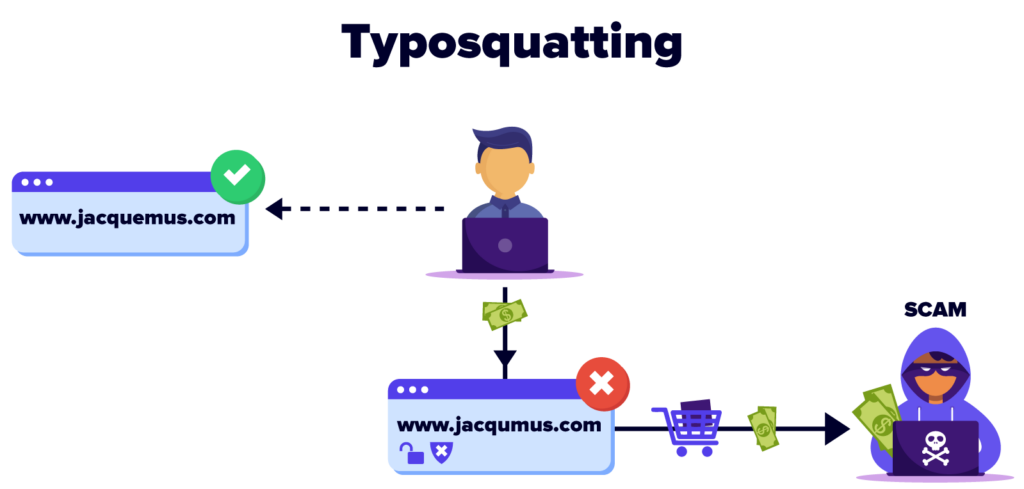
Welcome to the shady world of URL hijacking, or typosquatting.
So, what’s the deal with URL hijacking? People often mistype URLs and land on fake sites that mimic the real ones. They unknowingly click affiliate links, and hand over commissions to the hijacker without any added value.
Take French fashion designer Jacquemus, for example. His official site is jacquemus.com, but a crafty typosquatter nabbed Jacqumus.com (missing an “e”) and used it to spread malware to unsuspecting visitors.
How to Spot URL Hijacking
- Analyzing referral domains and traffic: Take a look at the domains and sources sending traffic to your affiliates. This can help you spot any unusual patterns.
- Talking with affiliates: Chat with your affiliates to learn how they bring in traffic. Keep an eye out for anything that doesn’t add up or seems off.
- Checking for domain typos: Use tools like ChatGPT to find possible misspellings of your domain. See if anyone else has registered those versions.
How to Avoid URL Hijacking
- Monitor domain registrations: Watch for any new domain registrations that might be typosquatting attempts.
- Register typo variations: Secure all possible misspellings of your domain and redirect them to your main site to stop hijackers from taking advantage.
- Take legal action: When needed, use legal means to protect your brand from cybersquatters.
- Teach your affiliates: Share ethical guidelines with your affiliates and make it clear that URL hijacking isn’t allowed in your program’s terms and conditions.
- Enforce the rules: Remove affiliates who break the rules by engaging in URL hijacking or other dishonest actions.
5 Cookie Stuffing
As an affiliate manager, you might’ve come across the term “cookie stuffing”. This is a shady tactic some affiliates use to generate commissions without users’ knowledge or consent. They place tracking cookies on users’ devices, even when they haven’t interacted with the affiliate’s content. Sounds fishy, right? Well, it’s not just unethical, but it can also land abusers behind bars, as seen in the notorious case of eBay vs Digital Point.
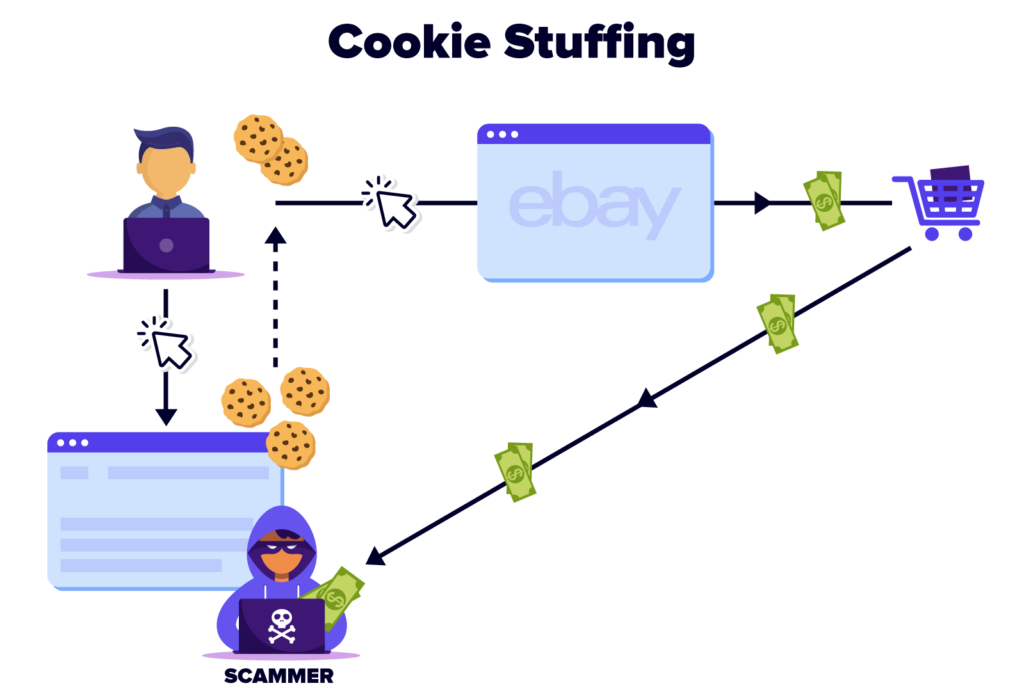
A Real-Life Example: eBay vs. Digital Point
In this jaw-dropping example of cookie stuffing, Shawn Hogan, the mastermind behind Digital Point, used a cocktail of methods to stuff eBay cookies onto unsuspecting users’ computers. He whipped up tactics like pop-ups, iframes, JavaScript, and CSS stylesheets to pull this off.
The result? Hogan bagged credit for sales he didn’t generate on eBay, racking up a staggering $28 million in dodgy commissions.
But crime doesn’t pay: eBay sued Hogan, and the FBI slapped him with a wire fraud indictment. In the end, he pleaded guilty and faced the music – a five-month prison sentence.
How to Spot Cookie Stuffing
- Examine traffic generation methods: Investigate how your top affiliates generate traffic and ensure it’s clean.
- Use tools: Fraud detection tools are built into affiliate platforms, which can help flag suspicious individuals.
How to Avoid Cookie Stuffing
- Watch your affiliates closely: Keep an eye on your top performers and investigate any sudden increases in traffic or sales.
- Set clear rules: Clearly state your policy against cookie stuffing in your affiliate program’s terms and conditions.
- Use advanced tracking tools: Employ the latest tracking technology to detect any dishonest behavior.
6 Google Ad Hijacking & Website Cloning
Google Ad hijacking, involves bidding on brand keywords, impersonating the brand or a reputable news site, and directing traffic to fake or cloned websites.
How Google Ad Hijacking & Website Cloning Works
In this affiliate marketing scam, an affiliate creates a landing page that’s a spitting image of your brand, complete with a domain name that’s just a typo away from your own. They buy traffic for branded keywords or ones related to your products, and suddenly, they’ve captured visitors who meant to go directly to your site to purchase your products.
When the visitor clicks the “buy” button on the affiliate’s site, they’re taken to your store, and the affiliate gets credit for the sale. You end up paying for sales they shouldn’t have gotten credit for because they hijacked your brand traffic. Pretty sneaky, right?
Some affiliates might even make a fake news article on a site that looks like a trustworthy source, like CNN or Fox News, to sell your product. Both of these methods can harm your brand and should be stopped as soon as possible.
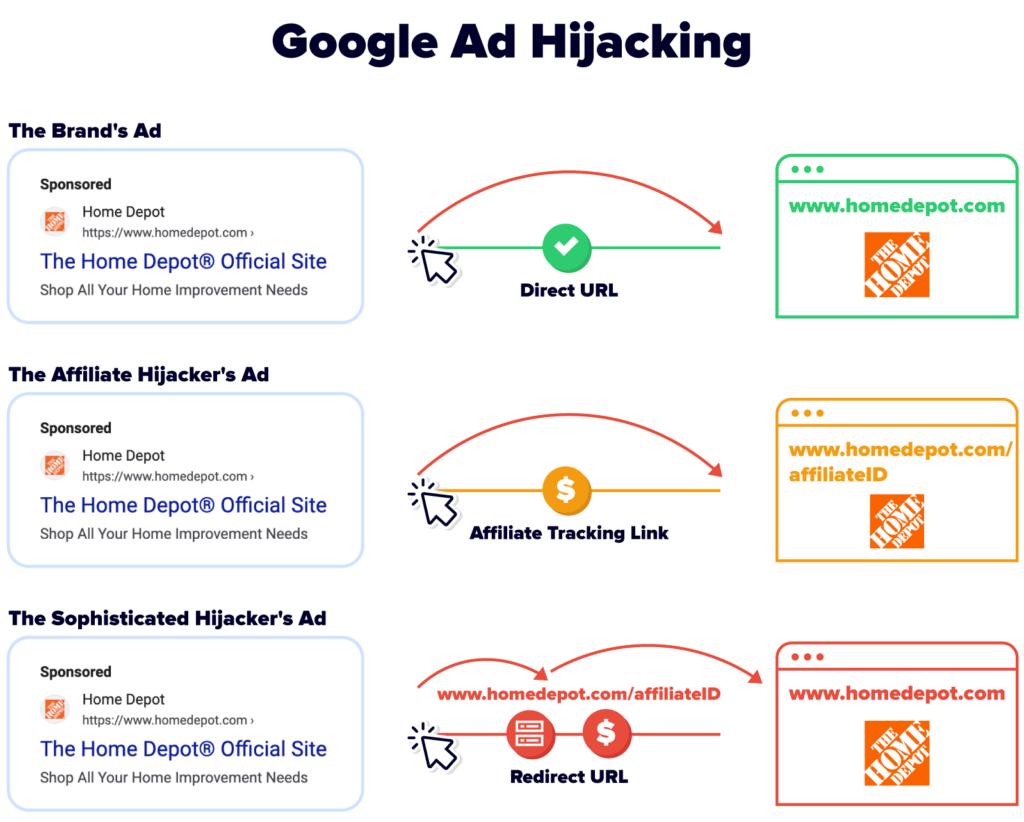
How to Spot Google Ad Hijacking
- Monitor the paid listings for your brand keywords:Regularly check the ads that show up when you search for your brand and product names on Google. Watch out for any strange ads that seem to be pretending to be your brand or promoting your products on a different website.
- Watch for unauthorized use of brand assets: Track where your brand assets, like your logo and images, are being used online. If you find them on a site that’s not connected to your brand, it might be a sign of ad hijacking.
How to Avoid Google Ad Hijacking
- Set clear advertising rules: Be very clear that affiliates are NOT allowed to bid on your branded keywords or copy your brand in any way.
- Buy misspelled domain names: Don’t let affiliates make lookalike sites. Get those common misspellings and variations of your brand’s domain name before they can.
- Stand up against copyright infringement: If an affiliate uses your brand assets without your permission, don’t be afraid to take legal action. Defend your brand’s reputation at all costs.
- Deal with rule breakers: If you catch an affiliate breaking your guidelines, kick them out. And don’t pay any commission they earned through their dishonest tactics.
Conclusion
To sum up, remember that the majority of the affiliate marketing world is legitimate. It operates in a fair and transparent manner. Affiliate marketing can be an incredibly safe and lucrative way to make good money online.
But, as with any industry, there will always be a small percentage of bad apples that can tarnish the reputation of the whole. With this article, we’ve broken down some of the most common affiliate marketing scams. We’ve also given you insights into how you can avoid affiliate marketing fraud entirely.
The next step is to create and grow your authority site so you can join and promote the best affiliate programs in your niche!
We can help you with that, too. Get all the tools and tips you need to be successful by signing up for our free training.
Affiliate Marketing Scams FAQ
How to spot affiliate marketing scams?
Affiliate marketing scams are schemes that trick or deceive affiliates or advertisers into paying for something that is not worth it or does not exist.
To spot affiliate marketing scams, you should look for warning signs such as:
– Lack of transparency or guarantees
– Pressure to act quickly or buy now
– Unrealistic or exaggerated claims
– Negative reviews or complaints
– No proof or evidence
How to avoid affiliate marketing scams?
To avoid affiliate marketing scams, you should do your research and due diligence before joining any program or promoting any product. You should also:
– Choose reputable affiliate networks and programs
– Check the product quality and legality
Is affiliate marketing legit?
Yes, affiliate marketing is a legitimate and effective way to make money online. It is a form of online marketing where you promote products or services from other companies and earn commissions when someone buys through your link. Affiliate marketing is used by millions of affiliates and advertisers worldwide and is embraced by many reputable brands. There is nothing shady or illegal about it.
Is affiliate marketing real?
Yes, affiliate marketing is real and can be a profitable online business model. Affiliate marketing is based on real transactions between real customers, affiliates, and advertisers. It is not a get-rich-quick scheme or a scam. It requires hard work, dedication, and learning. Affiliate marketing can help you earn passive income, build authority, and create value for your audience.
